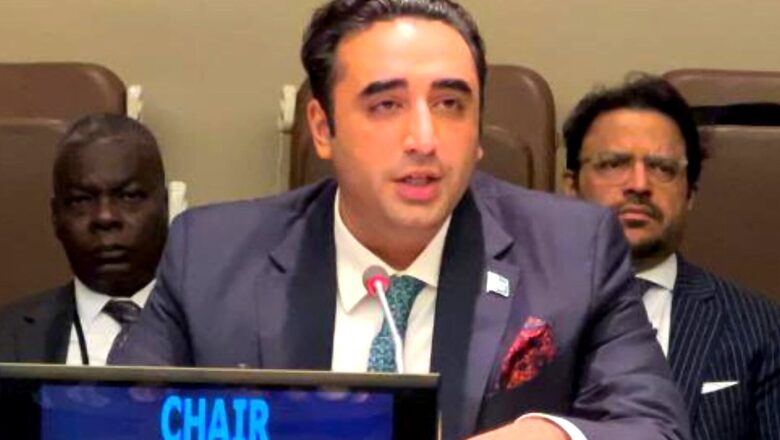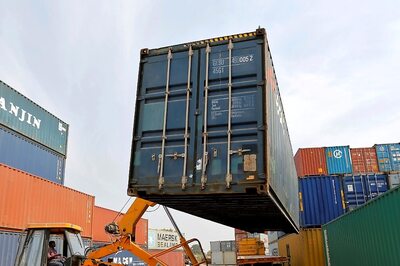
views
Pakistan seems to have come a long way since the 1960s when Swedish economist Gunnar Myrdal, in his book Asian Drama, found its diplomats better gifted with conviviality and social graces than their Indian counterparts. Times have changed, so has the Pakistani notion of diplomacy. This was evident last week when Pakistan Foreign Minister Bilawal Bhutto Zardari threw all diplomatic caution to the winds while criticising Narendra Modi, a duly elected Prime Minister of a democracy whose credentials are next to none. By this single act, which may get him some brownie points among his electorates back home and disparate Left-liberals across the globe, Bilawal has not just exposed his Rahul Gandhi moment in Pakistan politics, but also pushed back by years even the slightest chance of an India-Pakistan dialogue.
Let’s begin with analysing the first phenomenon: Bilawal behaved the same way Rahul Gandhi does, because of a sense of political entitlement the two have in their minds. It is this mindset that made Rahul trash in public a Cabinet-approved Ordinance in 2012 (it was a government run by his own party), calling it “complete nonsense” and “should be torn up and thrown away”. Bilawal and Rahul carry the attitude of their grandfathers/grandmothers, but they sorely lack their aptitude and talent. They just don’t have the ability and competence to do what Indira Gandhi and Zulfiqar Ali Bhutto would do.
Zulfiqar Bhutto was known for using four-letter words while speaking to an Indian across the negotiating table. But then he had the canniness to carry it with aplomb. So much so that Indira Gandhi, just before the 1972 Shimla meet, was advised by RN Kao, the then RAW chief, to “immediately count” her fingers after shaking hands with Bhutto. Yet, India’s iron lady shook Bhutto’s hand “in good faith, but having shaken it she forgot to count her fingers”, as Rajiv Dogra writes in his much engaging, anecdotal book Where Borders Bleed. India, thus, lost on the negotiating table what its armed forces had won on the battlefield.
As for the second point — that Bilawal’s anti-Modi diatribe has pushed by years even the slightest chance of an India-Pakistan dialogue — there seems to be no scope for long-term peace between the two neighbours till Pakistan changes its very intrinsic nature. Pakistan is not a normal state and its unifying factors are Islam and anti-India sentiments. Peaceniks and Track-II-wallahs would pin the entire blame on the Pakistan Army, which no doubt is a big problem, given that it “sees itself as responsible for protecting not only Pakistan’s territorial frontiers but also its ideological frontiers”, as C Christine Fair writes in Fighting to the End. But then, Pakistanis too look at their country as a ‘citadel of Islam’. Carey Schofield, an Oxford research fellow who was given “almost unrestrained” access to the Pakistan Army by Gen Pervez Musharraf, writes in Inside the Pakistan Army: “Pakistan society is becoming more pious, and the Army necessarily reflects the country.”
Here it needs to be understood that being in a Muslim-majority state itself creates “a kind of recidivist trance: ‘give us utopia or nothing’”, as Khaled Ahmed writes in Sleepwalking to Surrender: Dealing with Terrorism in Pakistan. To validate this, he recalls how Pakistan accepts the discipline of economics while ideologically rejecting the concepts of banking and savings, and how one prominent nuclear scientist promises to produce electricity for all of Pakistan from one “tamed jinn”!
Pakistan, given its Islamist origins, becomes an even more abnormal state. The very reason for its existence is anti-Hindu, anti-India sentiments and posturings. If there’s no fear of Hindu India, then there is no need for Islamic Pakistan. It is this nature that explains why both Islamists and liberals, civilians and military men, act seamlessly for the cause of Islam. Not surprisingly, Mohammed Ali Jinnah would drink alcohol, eat pork, smoke 50 cigarettes a day, and dress like an English gentleman, and yet he laid the foundation for Islamic Pakistan. Yes, Pakistan’s jihadi tendencies gained immense ground under the military rule of Gen Zia-ul-Haq, but what’s also irrefutable is that it was a socialist Prime Minister in Zulfiqar Bhutto who officially made Pakistan an Islamic Republic, and threw Ahmadiyyas out of the Islamic fold. Then, it was his ‘liberal’ daughter, Benazir Bhutto, who presided over the rise of Taliban 1.0, and her government was the first to recognise their barbaric rule in Afghanistan. Nawaz Sharif wasn’t different either, as he instituted the death penalty for blasphemy, besides introducing the infamous Shari’ah Bill. The 1999 Kargil conflict and the 26/11 Mumbai attacks took place when Pakistan had civilian governments.
The Islamist, anti-India feeling flourishes in Pakistan not because there’s the Army but because there’s a thriving civilian ecosystem which detests ‘Hindu India’. When a country is created in the name of religion, then it’s obvious that faith will dominate modes of thought and behaviour. It is, therefore, no surprise that a former Pakistani foreign minister, stretching both his arms in front of him and opening his palms facing skywards, said privately: “If God were to grant me a wish I would ask him to place a nuclear bomb each on my palms.” Then, with a smile, he turned his palms downwards and added, “One I would drop on Bombay, the other on Delhi” (Rajiv Dogra’s Where Borders Bleed).
Now, this is called the curse of geography. India just cannot change its neighbours, be it Pakistan or China. But it can definitely change itself to meet the challenges. India’s Pakistan problem, primarily, is its own making. It saw Pakistan as an extension of India. It believed that Pakistan thought the way a normal state would think — of progress, prosperity, and economic development. It took India almost six decades to realise that for an Islamist state, the economy comes second to religious duty and ideology. More so for Pakistan, whose very existence is based on anti-India stunts and posturings.
Such is the nature of the Pakistani state that secularism and liberal values are sacrificed at the altar of power. Anyone ruling that country will have to seek legitimacy from Islamists. Pakistan’s so-called democratic, liberal PMs Zulfiqar Bhutto, Benazir Bhutto, Nawaz Sharif and much recently Imran Khan — the makeover of Imran Khan from a suave, charismatic playboy to a hardened Islamist is too recent to be forgotten — went through this transformation. It should encourage Indians, who historically go weak-kneed whenever a “democratically elected” government comes to power in Pakistan, to have a reality check. Thankfully, the Narendra Modi dispensation, after initially treading the old, beaten path, seems to have mended ways, especially after the Uri and Pathankot attacks. The recent utterances from Bilawal Bhutto Zardari would further bolster this sentiment. One needs to know that Modi is just an excuse, so is the issue of Kashmir; it is the very idea of India that Pakistan is wary of.
The author is Opinion Editor, Firstpost and News18. He tweets from @Utpal_Kumar1. Views expressed are personal.
Read all the Latest Opinions here




















Comments
0 comment